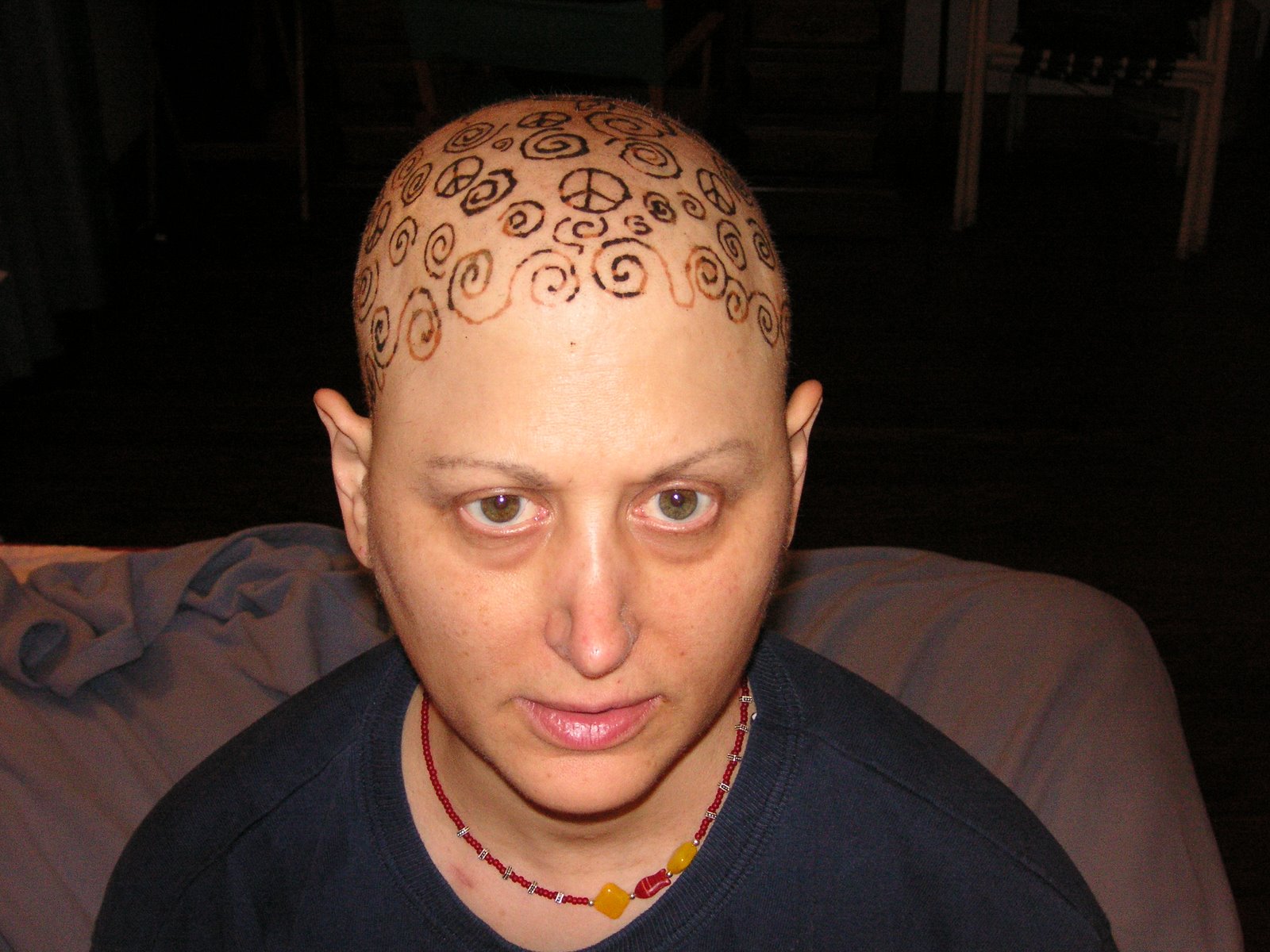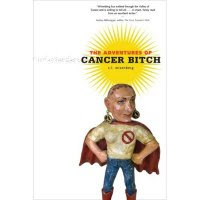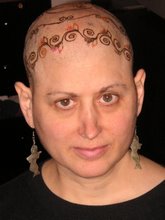When I'm in familiar crowds now, I know that certain people won't recognize me. I don't blame them. My hair was my outstanding feature: thick, dark, wavy. People (who know who I am) are telling me that they're seeing my face for the first time. Revealing more of myself has made me seem less myself. When you see more, you know less. Thus I am rendered strange. I am rendered different. I am rendered, in a way, invisible.
Not so invisible that I could go around asking people what they thought of me or my writing. That would be too strange. That is the fantasy--that we could disguise ourselves and see what people say about us, or "kill" ourselves off and witness the funeral, a la Huck Finn. Or was it Tom Sawyer? When I was younger (29) and my hair had no hint of gray, I disguised myself or passed myself off as a 19-year-old college sophomore and went through the paces of sorority rush. I wanted to see what it was like. I was being judged, but at a safe distance. I had the power. You could say I was re-enacting an event, but I'd never been through rush before. After two rounds, I was busted, but I didn't confess.
Most everyone loves the idea of being a spy, of changing identities, lighting out for the territories and changing our names and lives. Maybe there aren't second acts in America, but there are third and fourth and fifth ones. What became of him or her? we ask. We're not asking exactly, Who did she become? but that might be close.
I was a spy one other time. The summer before graduate school I took a part-time marketing job in an architecture firm and worked on a novel the rest of the time. One of my duties was to go to the public library and search through the annual reports of local companies and school districts, in order to find likely clients. I'd also call these clients: Hello, I'm (Cancer Bitch) and I'm doing a survey for OWP Marketing about architecture firms. Do you have a firm that you work with? OWP were the initials of my employers. Sometimes the person on the other end would ask, Who are you working for? I forgot how I was supposed to respond. I assume that I was supposed to be as vague as possible and never confess.
In fifth and sixth grades, we also conducted surveys. You would get a friend of yours from another school to call a boy you were interested in. She would say, I'm doing a survey. Please rate these girls as potential girlfriends, A, B or C. Your name would be buried somewhere in the middle. She'd ask him to rate cuteness and personality, too. You'd know the results the minute your friend hung up the phone. And the boy knew that his answers would be made public.
How did we come upon this sophisticated marketing technique at age 10 and 11? I still remember that J rated me high in personality. He hadn't been surveyed on my account, but I was pleased to have the information. It was really his blond neighbor C who I was interested in, with whom I slow danced (several times) one Saturday night. I thought that meant we had an understanding. I'm still waiting for him to call. I wouldn't have dared to survey C; he was a grade older, and maybe unfamiliar with such ploys. Each grade had its own culture. Now we all have web sites and can count our visitors (at least theoretically; I don't know how to track them) and can look up our books' statuses on Amazon and read our students' evaluations of us and get our friends to contact the radio station to praise the Cancer Bitch series. I knew a feature writer at a major paper who wanted to become the dance critic. Every time she wrote a dance review she had her friends write letters to the editor praising her review. And it worked. And then she got breast cancer and it came back and in 2002 she died.
skip to main |
skip to sidebar


taramosalata & other dips; photo by Vera Szabó

cream puffs, caprese; photo by Vera Szabó

Don't try this at home. Uh, oh, we did.

L the Haircutter in Background

Finished.

design by Jennifer Berman

At medicinal baths, with testimonials from patients
One Feminist's Report on Her Breast Cancer, Beginning with Semi-diagnosis and Continuing Beyond Chemo, w/ a side of polycythemia thrown in **You don't have to be Jewish to love Levy's rye bread, and you don't have to have cancer to read Cancer Bitch *** Cancer Bitch comes to you from S.L. (Sandi) Wisenberg in Chicago
Click on photo for Cancer Bitch reading/lecture schedule
Blog Archive
-
▼
2007
(192)
-
▼
May
(18)
- Lolita in Chicago
- Fancy O Fancy
- Post-Funeral
- The Blessing
- Funeral
- How Not to Be Intimidated
- Free Dinners & Free Dinners
- Foot, Horns, Feathers
- Cloak of Invisibility
- The Mothers
- The Watcher Watching Herself
- Cancer Bitch definitely on the air Thursday, May 10
- When the Obit is More Fun than the Front Page
- Bitches
- The Holter (Not Halter)
- Our Continent and Then Some
- At the Office of the County Assessor
- Barking, Berkeley, Hyde Park
-
▼
May
(18)
Cancer Bitch recommends these links:
- Alternet.org
- As the Tumor Turns
- Being Cancer--its on-line book club discusssed my book.
- Big Grrls DO Cry: queer life meets precarious life
- Black Gyrl Cancer Slayer
- Breast Cancer Action
- breastcancer.org
- Chemo Chicks
- Chronic (Illness) Babe
- Code Pink women's peace group
- Collaborative on Health and the Environment
- Colon cancer cowgirl
- Earth Henna
- Friends of Cancer Bitch on Facebook
- Funny Cancer shirts and mugs
- Gayle Sulik, Pink Ribbon Blues
- Geezer Sisters (tho' only written by one of them)
- Get Real About Breast Cancer (w/ pic of Breast Cancer Barbie)
- Gilda's Club
- Goodbye to Boobs (by a pre-vivor)
- Humerus Cartoons
- I got the cancer (lymphoma)
- Mamawhelming
- Organic Consumers Assn.
- Our Bodies, Our Blog
- Paula Kamen
- Planet Cancer
- Recovery on Water
- S.L. Wisenberg/Red Fish Studio
- Skin Deep: un/safe cosmetic list
- Stacey Richter's Land of Pain
- Swimming in the Trees: author Jessica Handler of Atlanta
- Tara Ison
- Terry Tempest Williams
- The Assertive Cancer Patient
- The Cancer Culture Chronicles
- The Fifty-Foot Blogger, another denizen of Fancy Hospital
- Whirled News--better than the Onion
- Women & Children First bookstore
NOTATE BENE
Everything here is as accurate as I could make it. Occasionally I've changed identifying details when writing about others.
Links to audio and video

from my Farewell to My Left Breast party

taramosalata & other dips; photo by Vera Szabó
Farewell to My Left Breast Party

cream puffs, caprese; photo by Vera Szabó
April 12, 2007--The Making of the Mohawk

Don't try this at home. Uh, oh, we did.
The Mohawk Profile

L the Haircutter in Background
The Mohawk Demure

Finished.
Summer henna-wear
design by Jennifer Berman
Life after cancer, Budapest, July 2009
At medicinal baths, with testimonials from patients

